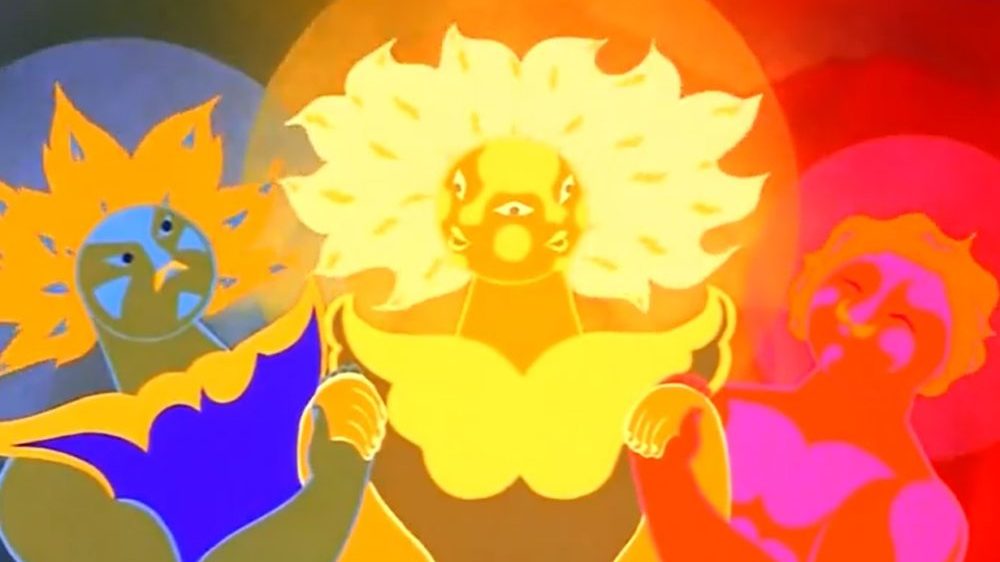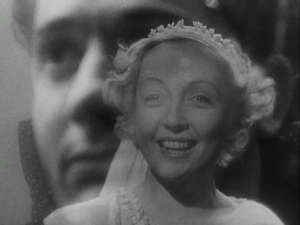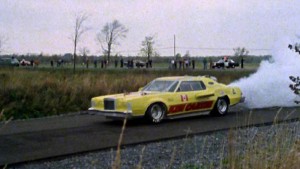
Sometimes you have to follow your gut. Sometimes you’re dicking around online and you catch a glimpse of a poster for a film you’ve never heard of, and you conclude that it would look great framed on a wall or airbrushed onto the side of a van. Then you dig a little deeper, and what started off as another Internet rabbit hole ends up yielding an unheralded masterpiece from the Eastern Bloc. Beyond being an extraordinary work of analogue animation, 1981’s Son of the White Mare is total and irrefutable proof that the Long Seventies are a thing. Despite that release date, everything, from the color palette to the score to the transition effects of the film, just reeks of the 70s. But not only does the movie confirm the existence of the Long Seventies, it also proves that they transcend geography, because Son of the White Mare deserves to be mentioned in the same breath as Fantastic Planet, The Holy Mountain, and Belladonna of Sadness in the canon of groovy international psychotronic cinema.
Director Marcell Jankovics is the father of Hungarian animation, having helmed the nation’s first full-length animated film Johnny Corncob in 1973. His best-known work outside his homeland might be his stark 1974 short Sisyphus, which was licensed by General Motors in 2008 and used to hock SUVs during Super Bowl XLII. With the money from that deal, he was finally able to complete The Tragedy of Man, an aptly-named 160-minute leather-bound beast of a film whose production spanned 23 years. That film, like most of Jankovics’ work, skews mythic and epic: a soldier’s odyssey, the struggle of Sisyphus, the passion of Pygmalion, the folly of Man in the face of God. Elsewhere, he has refracted national myth through the lens of the surreal. True to form, Son of the White Mare is an animated retelling of a Hungarian folk tale filtered through the twin prisms of William Blake and blotting paper. There is a veritable deluge of yonic imagery, not the least of which occurring in and around the “world tree” of Hungarian pagan myth and the subsequent birth of our titular hero, a Hercules figure known as Treetearer. He is brought into the world via a suggestive swelling of diffracted rounded shapes. The mare raises him and regales him with the tale of the monarchs of yore and the evil dragons that ended their reign. This, and every other story in the film, is rendered in bright, boldly-colored Richard Williams-esque tableaux that zip and pirouette from setpiece to setpiece. All the while, Treetearer grows up able to uproot the very foundation of the Universe, and sets off to rid the land of the evils his mother spoke of, soon to be joined by his excellently-named demi-god brothers, mountain-man Stonecrumbler and master blacksmith Ironkneader.
Son of the White Mare combines the elemental purity of fairy tales with the wild expressionism and avant-garde stylings of contemporary animation. It is so classically-styled in its structure that most of the important events in the film even happen in triplicate; when the brothers happen upon a cabin on their hunt for the dragon’s portal into the underworld, they each get accosted by an imp who wants to eat all their porridge. Stonecrumbler and Ironkneader both get bested by the imp, resulting in a literal spanking from the two other brothers upon their return, which is exactly as weird and startling as that sounds. But Treetearer gets the jump on the imp; he pulls a Delilah by shaving off his power-bearing beard, which looks like an ever-cascading stream of cotton candy, and goes on to ask Ironkneader to make a shatterproof sword out of it. He then uses that sword as leverage to get directions from the imp when he meets him in Hell. The whole film is similarly episodic and just as tantalizing in its marrying of fairy tale tropes, dream logic, goofy fantasy, and bravado modernist animation.
So yes, this movie is a work of genius, but what guts me is that there’s no easy, on-the-level way to see it. There’s an unsubtitled Hungarian Region 2 DVD available, but acquiring one may be a pain in the ass for you or me. There’s not even an old tape somewhere you can get, unless, of course, you booted it off of Hungarian state TV. Now, there’s a fan-translated rip floating around in the usual places, which, full disclosure, is where I watched it. But I am going to use my tiny, tiny platform to implore some enterprising distribution company to license this film and give it the VIP treatment it so richly deserves, because Son of the White Mare is a masterwork that deserves to be seen far and wide.
—
Directed by Marcell Jankovics; written by Marcell Jankovics and László György; based on Ferhelofia by László Arany; starring György Cserhalmi, Vera Pap, Gyula Szabó, and Mari Szemes; 81 minutes.



 Derek
Derek
 Isabelle
Isabelle